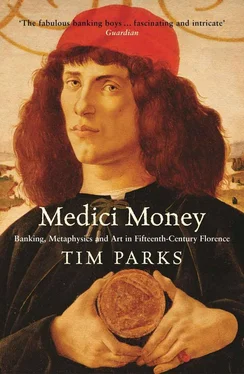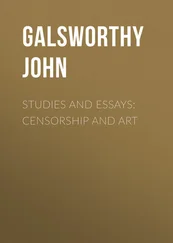Or perhaps not. “I invoke God’s curse and mine on the introduction of possessions into this order.” The words appear on a scroll held by a saint in another of Fra Angelico’s depictions of the Virgin in San Marco, this time in a dormitory corridor where the only viewers would be the monks. Someone wasn’t happy. Cosimo had asked for the restriction on bequeathing money to the Dominican order to be lifted, but the monks were resisting. They hadn’t committed their lives to the severest of disciplines in order to grow rich. Was it right for a moneychanger to occupy such a position in their community? There was a sell-by date, it seemed, on much of what Cosimo did. Whether in the field of banking, or religious art, or politics, the magical balancing act, the expensive reconciliation of the irreconcilable, could last only so long.
IN 1438, HARD-PRESSED by the Turkish war machine, the leaders of the Eastern Church had come to Ferrara to see if they could resolve their doctrinal differences with the pope, accept his authority, and in return get help to raise the long siege of Constantinople. When Ferrara was hit by the plague, Cosimo took advantage to invite the Church leaders to Florence. Medici money brought the Orient to town, their strange clothes, their Greek manuscripts. Medici money paid for their lodgings, their food, their meeting places, as banking money today pays for so many well-meaning conferences.
Does the Holy Spirit proceed only from God the Father, as the Eastern Church maintained, or from both God the Father and God the Son, as Rome insisted? That was the issue under debate. It must have seemed child’s play to a man used to the stubborn complexities of international trade. Surely one just decided, this or that. And after months of bitter dispute, the priests did in fact agree that Rome was right. Christendom rejoiced. Cosimo had played his part in resolving the schism that was the shame of every believer. But back in Constantinople, the Greek holy men were told they had exceeded their mandate, they had conceded too much, they had merely accepted the authority of the pope. The pact broke down. Even at the expense of annihilation, the Greeks didn’t want to accept that they had got it wrong about the Holy Spirit. And if they persisted in such grave errors, Western Christendom could hardly be blamed if it left their eastern cousins alone against the mighty Turk. Even the most pious of bankers could do nothing about such determined integrity.
And there was very little Cosimo could do when the company of Giovanni Venturi and Riccardo Davanzati failed in Barcelona in 1447. Venturi & Davanzati, one of many Italian trading companies in Spain, had played a critical part in the process by which the Medici bank sought to keep money circulating among its various branches. The Barcelona company bought cloth from the Bruges branch of the Medici bank. The money it owed Bruges was then held in the Spanish city, to be drawn on by the Venice branch of the Medici bank to honor letters of credit issued to Venetian merchants who were importing saffron and Spanish wool. The merchant handed in his money to the Medici branch in Venice and Venturi & Davanzati paid it out to his suppliers in Barcelona. In this way, Bruges reduced its debt with Venice and with Italy in general.
But in the summer of 1447, the Spanish company was unable to honor 8,500 florins’ worth of letters of credit. The Venetian merchants demanded their money back from the Medici. Bruges was left without payment for vast quantities of cloth and above all without a way of returning money to Italy. With the elaborate system of triangular trading on which the Medici bank depended becoming ever more precarious, the only solution now seemed to be to encourage Henry VI of England to accept loans in return for which he would allow the Medici to increase the amount of wool they were buying and sending to Italy. The loans would be repaid by exempting the Medici from export duties on whatever they bought.
It was a dangerous and expensive way of bringing money back to Italy, since it involved the constant concession of large amounts of credit. Medici managers set off for Contisgualdo (the Cots-wolds) to watch the sheep shearing, then down to Antona (Southampton) to arrange for transport. With the monopoly of their own trade organization bypassed, the English wool merchants were furious. And many of the Florentine monks were likewise getting increasingly irritated about the number of bankers appearing in sacred paintings and demanding pride of place in their prayers. It seemed the more money you spent on those who wished to stay pure and poor, the greater the possibility of a fundamentalist backlash. Everywhere tension was building. In 1452 Girolamo Savonarola was born. Less than half a century hence, this fiery preacher would be running Florence and the Medici would have fled. Albeit briefly, the city of God would replace the Medici regime. In the political field as elsewhere, Cosimo’s solutions always had a precarious feel about them.
THERE WAS A question that from time to time would form on the lips of the Florentine ruling elite: Should we admit such and such a person — a foreigner, an ambassador, a vulgar self-made man — into “the secret things of our town”? But surely, you object, in an open republic with a written constitution, there are no secrets, aside from military matters. What was this about?
On return from exile in 1434, Cosimo held no institutional position. He was a private citizen whose sentence had been revoked. He was the head of a triumphant faction taking power from another. Factions were illegal. The government, as we have seen, was elected by lot: at the top the signoria , which is to say eight priors and the gonfaloniere della giustizia . They proposed all legislation and held the powers of chief magistrates. Then the advisory bodies of the Sixteen Standard Bearers and the Twelve Good Men; then the Council of the People and the Council of the Commune, whose one power, but considerable, was that of a veto on legislation proposed.
What did Cosimo have to do with all this? What more could he be than another name in the leather bags from which, at staggered intervals, the podestà —a sort of mayor with no political power, usually a man from out of town — would select the members of the various government institutions, at random? The names in the bags were determined by a “scrutiny” held once every five years that assessed the male population on such criteria as age, wealth, family, guild membership, criminal record. On ousting the Medici in 1433, the Albizzi had held an unscheduled scrutiny to have the right sort of names put in the bags. Their great mistake had been not to eliminate the names of the previous scrutiny but merely to add new ones. Thus, with bad luck, it had happened that a pro-Medici signoria had been picked.
Whenever the process of government was stalled, when the priors kept proposing as essential something the councils repeatedly vetoed as nefarious, then, as we recall, a parliament was called. The people flocked into the Piazza della Signoria and were bullied into conceding draconian powers. One says, “flocked,” but in this archive-obsessed state, no accurate record was kept of the numbers of people in the piazza for a parliament. Nor of the way the vote split. It didn’t split. This was an exercise of pure power, thinly dressed as democracy.
Why did the priors not call a parliament more often? Because the democratic rags were so very thin that not only did they fool no one, they didn’t even allow people to pretend that they had been fooled. It had become important for the Florentines, as it is important for us today, to imagine that they shared, as equals, in a process of collective self-government. Should this patently not be the case for any extended period of time, then rebellion became legitimate. But as with the question, When is an exchange deal a loan with interest? or again, When is church patronage an expression of secular power? appearances, perceptions, definitions, and above all words were of the utmost importance. A coup d’état, for example, is called a parliament.
Читать дальше












